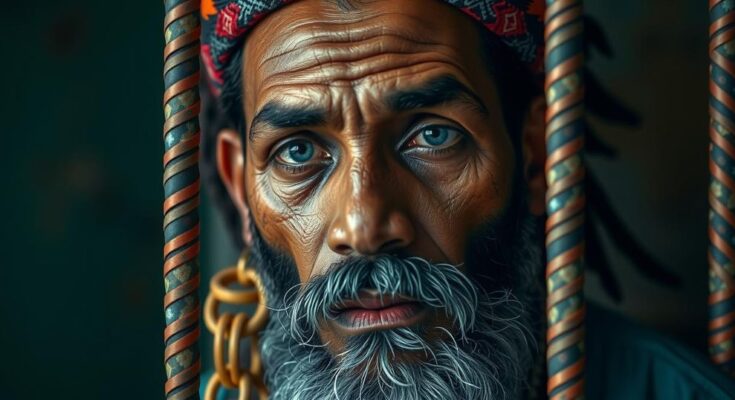Filep Karma, a political prisoner from West Papua, became a symbol of resistance against discrimination and the fight for Indigenous rights in Indonesia. His journey, marked by courage and activism, saw him document abuses within the prison system and inspire movements for justice. After being imprisoned for 11 years, he was released in 2015, only to continue advocating for Papuan independence until his passing in November 2022, leaving a powerful legacy behind.
In December 2008, I visited Abepura prison in Jayapura, West Papua, to investigate reports of torture and resource shortages submitted to the United Nations. After passing security checks, I joined the Sunday service with about thirty inmates, where I met a man in a small Morning Star flag—a symbol of Papuan independence—named Filep Karma. This surprising display of defiance on the part of an imprisoned leader sparked my interest, leading to numerous conversations about his activism and courage. Filep Karma was born in 1959 to a well-educated family in Jayapura. Upon returning from his studies in 1998, he became involved in the West Papua independence movement, leading a symbolic raising of the Morning Star flag, which resulted in a military attack that left at least eight dead. This act of nationalism led to his arrest and an 18-month prison sentence. Karma’s peaceful yet determined advocacy for Indigenous Papuan rights established him as a prominent leader. While working as a civil servant and engaging in activism, he meticulously documented mistreatment at Abepura prison, providing information that led to a Human Rights Watch report and inquiries by the Ministry of Law and Human Rights. Facing severe health issues by August 2009, Karma required surgery that continued to be delayed by bureaucratic hurdles. He reflected on his previous tenure as a bureaucrat, noting his disbelief at such negligence. Support from Papuan activists resulted in substantial donations for his medical expenses, emphasizing the community’s mistrust of the government regarding his safety during treatment. When admitted to Cikini Hospital, tight security surrounded him due to the presence of prison guards and concerned friends. After his recovery, he celebrated his brief freedom during visits and family gatherings before returning to Abepura prison, where he continued his studies and drew inspiration from figures like Gandhi and Martin Luther King. In May 2011, a petition was filed on Karma’s behalf to the UN Working Group on Arbitrary Detention, which ruled that his detention breached international standards. Despite this, President Susilo Bambang Yudhoyono refused to release him, resulting in increasing international scrutiny and condemnation regarding human rights in West Papua. After years of incarceration and advocacy, Karma was finally released in November 2015 and returned to a hero’s welcome. He resumed his activism, giving speeches on university campuses about human rights and environmental issues in West Papua, while also writing a significant book on discrimination against Indigenous Papuans.
Filep Karma’s journey began as a college-educated leader embroiled in Indonesia’s political turmoil. His significant acts of peaceful resistance during a precarious time for Papuans shaped his legacy as a political prisoner advocating for human rights. The sociopolitical climate in Indonesia, marked by a history of military violence against Papuans, framed Karma’s experiences and his eventual release after years of imprisonment, illustrating a broader context of persistent advocacy for Indigenous rights amidst governmental oppression.
Filep Karma’s life epitomizes the struggle for Papuan independence and the fight against systemic racism. His courage and resilience forged a legacy that resonated far beyond prison walls, inspiring a new generation of activists in the fight for justice. Despite his untimely death in 2022, the impact of his life’s work remains palpable among the communities he championed, honoring a legacy rooted in the pursuit of freedom and equality for Indigenous Papuans.
Original Source: www.hrw.org



